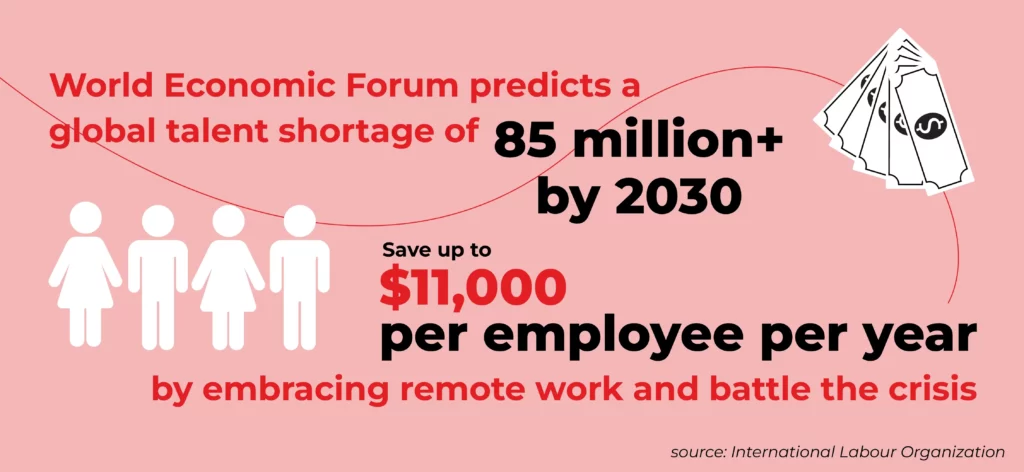We have all learnt the benefits of remote work in the last couple of years, but have you ever wondered how it is made possible? ‘Cloud staffing’ is the answer. It is a term originally coined by Lloyd Ernst, CEO of a remote staffing company.
It refers to a model of workforce management that involves hiring and providing professionals with the necessary infrastructure to perform their duties remotely. This technology has become increasingly popular in recent years due to the rise of remote work and the benefits it offers to both employers and employees.
It is also considered as a viable solution to address the current talent shortage worldwide, affecting various industries and sectors. Caused by factors like demographic and work preferences changes, and skill gaps, remote hiring can help companies access a global pool of talent to help fill gaps in their workforce.
In this essay, we will discuss its benefits and the services where it can be used. So, if you are looking to expand your small or medium size business, look no further!
Benefits a business could expect:
Cost Savings:
Being one of the primary benefits, the use of cloud technology allows you to save money on hardware and software expenses, IT staff salaries, maintenance of a physical office, and office equipment.
Additionally, you can save on employee wages, reducing overall costs, by:
- Hiring workers from regions with lower costs of living, and
- Paying only for the services you need, reducing overall costs.
These solutions generally operate on a subscription basis, which has your typical pay-as-you-go mobile phone payment plan model. Taking all this into consideration, you can expect savings of up to $11,000 per employee per year by embracing remote work, according to the International Labour Organization.
Retain Scalability:
Cloud staffing empowers you with the ability to scale up or down depending on business needs. This flexibility allows you to meet staffing demands more efficiently. It is particularly useful if you own a startup or a small-medium sized business that may not have the resources to hire full-time employees.
By being allowed to hire professionals for project-based assignments, you could demand specific skills and expertise, without having to worry about the cost of training and development. In such cases, you would also not have to worry about long-term commitments. It is the job of staffing agencies to be able to easily add or remove resources as per your requirements.
Business Expansion:
By leveraging the scalability remote staffing offers, you can rapidly expand business operations and increase its market share. The flexibility to delegate peripheral business tasks would grant you time, energy and money to focus on achieving core enterprise goals.
Businesses that use cloud staffing can reduce the time to deploy new applications and services by up to 50% and their IT infrastructure costs by up to 25% (Frost & Sullivan; Gartner). This can be especially beneficial for businesses that are looking to expand rapidly, as they need to be able to invest their resources in other areas of the business and quickly adapt to changing market conditions and customer needs.
Talent Accessibility:
Did you know that the World Economic Forum predicts that there will be a global talent shortage of over 85 million people by 2030? By using cloud staffing solutions, companies can tap into a global talent pool and hire professionals from anywhere in the world, addressing the talent shortage problem.
It streamlines the staffing process, reducing the time and effort required to find and place candidates. The use of automation and artificial intelligence (AI) helps to speed up the process of screening resumes and identifying suitable candidates. Additionally, it provides real-time data and analytics, allowing staffing agencies to make more informed decisions and optimize their operational processes.
Data Security:
You must be aware of cloud computing as an option to store, manage, and process business data. However, with its growing use, comes the increased risk of data breaches and other security threats. 74% of companies that used third-party staffing providers had implemented advanced security technologies, such as data encryption and multi-factor authentication, compared to only 53% of those that managed their cloud infrastructure in-house, as per the International Data Corporation.
Cloud staffing is one solution that has emerged to help mitigate these risks. Along with robust data security features, including backup, and disaster recovery, it typically adheres to industry standards and regulations, ensuring that data is managed and stored in a compliant manner.

Improved Efficiency:
According to a survey conducted by the Harvard Business Review, companies that embraced remote work experienced a 40% increase in productivity and efficiency. The ability of users to work remotely improves the chances of employers to complete projects faster and with greater efficiency than if they relied solely on their in-house staff.
Hiring agencies can collaborate with clients and candidates from anywhere in the world. Furthermore, they can hire professionals who are already trained and experienced in their field, saving time and money on recruitment and training costs. Additionally, they come with infrastructure that helps remote workers collaborate and communicate effectively, which can further improve productivity.
Increased Brand Loyalty:
75% of customers are more likely to buy from a business that recognizes them by name, recommends products based on their past purchases, or knows their purchase history (source: Accenture). 32% of customers will stop doing business with a brand they love after just one bad experience (PricewaterhouseCoopers).
Cloud staffing helps businesses increase brand loyalty by providing a seamless and consistent customer experience across all touchpoints. By leveraging its scalability and flexibility, businesses can quickly adapt to changing customer needs and expectations, leading to better quality customer service and helping build brand loyalty over time.
Industries and Sectors served:
Cloud staffing solutions are not just limited to a particular industry or sector. They can be used in a variety of fields, which are facing a shortage of workers with specific skills, such as software development, artificial intelligence, cybersecurity, marketing, design, customer service, and more.
For example, a software development company may use it to hire remote developers with specific skills and expertise for a particular project. A marketing agency may use it to hire remote designers and copywriters for a specific campaign. A customer service department may use it to hire remote agents to handle customer inquiries.
Recruitment:
You can use these solutions for recruitment, including posting job listings, receiving resumes, and conducting candidate screenings. The use of automation and AI helps speed up the recruitment process, making it more efficient and cost-effective.
Employee Management:
If you are looking to manage employees better, including tracking employee hours, managing employee benefits, and monitoring employee performance, then these solutions provide a centralized platform for managing data, reducing the risk of errors and inconsistencies.
Payroll and Billing:
These solutions can also be used for payroll and billing processes, including generating invoices, tracking payments, and managing expenses. They automate many of the manual processes associated with it, reducing errors, and improving efficiency.
In conclusion, cloud staffing solutions provide numerous benefits to both employers and employees, including cost savings, improved flexibility or scalability, increased accessibility, data security, enhanced efficiency, and a viable solution to the talent shortage problem. These can be used in a variety of industries and sectors, making it a versatile solution for businesses of all sizes, including recruitment, employee management, and payroll and billing.
As remote work continues to gain popularity, you can expect a shift in more organizations adopting virtual hiring solutions to optimize their recruitment processes and remain competitive in the marketplace.


